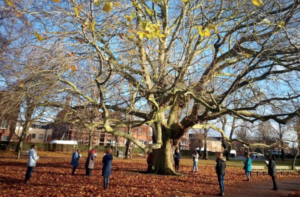-
Towards a new attitude
Human activity and presence have been causing many changes in the planet’s structure, climate and natural cycles. Lately, these changes have had dramatic consequences, bringing to our attention the urgent need for adjustments in the way our modern society relates to the natural environment. It is possible to assimilate new habits that improve health and wellbeing in our daily routine, whilst managing to coexist respectfully and over time with the biodiversity and abundance of natural resources available on our planet. P.O.S.T.O. Água contributes to that by sharing a practice of connection with nature that is accessible to everyone, no matter one’s age or occupation.

INTRODUCTION
Inspired in Delicate Empiricism, the approach used by Johann Wolfgang von Goethe to investigate natural phenomena, we cultivate a personal practice that involves drawing from observation, focus on our breathing, and direct contact with a plant. In a contextualised approach, we learn to assimilate and register alternatives to verbal language, opening space to capture images, sensations and emotions, as well as intuitions that may arise in our process of cognition.
We learn to keep contact through the act of looking, drawing and breathing, during exercises that, if practiced on a daily basis, can bring exponential benefits. The training involves observing general and detailed aspects of a plant: its health, its development, its ability to regenerate itself and, throughout this contact, to observe what is happening in our own bodies and to our feelings and emotions while we practice.
To introduce the method, we use plants in pots or in gardens to which the practitioner has easy and daily access, and where it is possible to stay quiet and undisturbed.
Presential lessons and workshops are offered when possible. In each module you will receive didactic material available either in Portuguese, English or Italian.
Lessons for the introductory course are offered as:
Presentation Module
Individual: module with 6 lessons on-line live, or presential, 45 min each
Group: Module with 6 lessons on-line live, or presential, 1h 30 min each, for a maximum of 6 people
Follow-up Practice
Weekly encounters on-line live or presential, in groups up to12 people. Only for those who have completed the presentation module.
Follow-up Practice in Parks and Gardens
Parks and gardens provide excellent opportunities to get in contact with nature and learn about many of the connections that form an ecosystem. There, human interference has influence in the variety and distribution of plant species, their growth, nutrition, irrigation and even in the diversity of animals and insects. Even so, we can observe plants of several kinds, from grass to flowers, trees and bushes, which, rooted in the ground and expanding in the open air, are precious sources of connection.
[For more information click here]
-
Testimonies
“This practice is freeing and grounding at the same time. It helped me to step outside my usual worries and brought me another frame of mind.”
“It seemed to me useful to work on the ability of careful observation which is crucial for this time of fast transition we are living in.”
“After the workshop I headed back to the office and I realized that the practice had hit me even more than I realized at first.”
“Our follow-up meetings always ended by uncovering something new.”
“The workshop improved my wellbeing by allowing me to have another coping strategy to use when I’m feeling done. It made me become calm and focused on the beauty of the plant and the element of uncovering something new in relation to the creativity of my drawing.”
“As someone who suffers a lot around anxiety, especially around schoolwork, I found the practice really useful. There is something so calming about focusing on the individual details of the plant.”
“I must have walked past that plant for so many times a day and only now did I really see it.”
“It has rejuvenated my relationship with plants. It’s such a connecting practice.”




